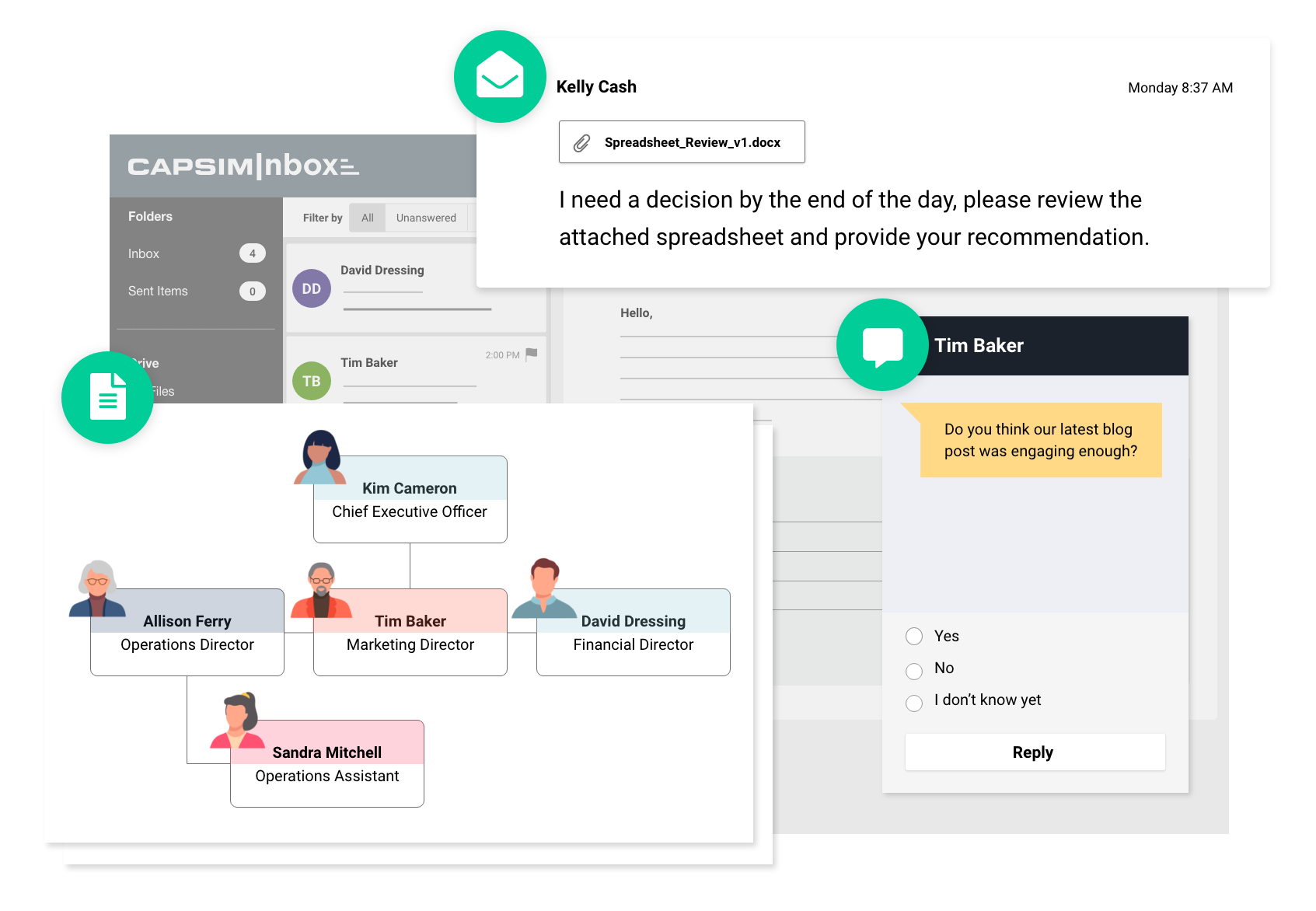Develop Effective Managers: 9 Essential Soft Skills for Managers in 2022
May 31, 2022
%20(1).jpg)
Who was the best manager you ever had?
They were probably easy to talk to, helpful, and helped you get better at your job.
Now, think of your worst manager. What did they do to earn themselves the title of your worst-ever manager? Perhaps they micromanaged your role. Maybe they were perennially unprepared or unapproachable and quick to anger.
A poor manager can change your entire work experience. That’s why it really matters who is leading the teams in your organization.
This article will identify the most important leadership soft skills managers need to perform in their jobs. We’ll also discuss why traditional soft skill development methods are flawed.
Finally, we’ll show why inbox simulations are the best solution for developing soft skills for managers (and any employee).
Soft Skills for Managers: The Skills and 1 Secret Tool Managers Need to Succeed
Managers are vital to the success of your organization. We don’t just mean upper-level management, either. Upper-level managers wield a large amount of decision-making power. But if you’re looking for the leaders with the most power to influence culture and change in your organization directly, you need to focus on mid-level managers.
Mid-level managers provide a crucial connection between upper management and the front-line employees who handle the organization's day-to-day operations. An employee’s direct leadership profoundly impacts their experience working for your organization.
The majority of the employees in your organization report to mid-level managers. In other words, your mid-level managers define the employee experience at your organization.
How severely can a poor manager impact your organization? Let’s examine just a few of the issues created by poor management:
- 84 percent of workers say poor managers create unnecessary work and stress in the workplace.
- 65 percent of workers would rather get a new boss than a pay raise.
- 82 percent of employees reported that they considered leaving their job due to a bad manager.
If your mid-level managers are handling their positions poorly, you risk higher attrition rates, lower productivity, and higher rates of stress in the workplace.
On the flip side, positive management can help retain great employees, increase productivity, and increase employee satisfaction. But this begs the question: What makes a great manager great?
Related Read: How to Conduct Soft Skills Training Employees Will Actually Enjoy
Let’s look at the soft skills and traits that make a fantastic manager—and how to develop them in your employees.
What soft skills do managers need?
Strong soft skills are the crux of what makes a great manager. Let’s take a closer look at the soft skills you should encourage and foster in every manager in your organization:
Emotional Intelligence
Emotional intelligence, often called “EQ,” is a person’s ability to understand and manage their own emotions. Self-awareness and empathy often fall under the umbrella of emotional intelligence.
Example:
An emotionally intelligent manager can determine when outside stressors impact their mood, enabling them to self-regulate rather than take their frustrations out on their employees.
Communication
Communication skills refer to all the ways your managers interact with other people. This includes interactions with employees, customers, and other leaders at your organization. Communication skills impact a manager’s ability to collaborate, set expectations, and listen to their employees.
Example:
A manager who is an effective communicator can clearly articulate the requirements and expectations for a project to their subordinates. They may also schedule regular touchpoints with subordinates to get feedback and ensure they have an ear to the ground for how their employees are functioning daily.
Decision-Making
Decision-making skills refer to your manager’s ability to choose between two or more options. Many of these decisions must be made under pressure in the business environment. Strong decision-makers can assess a situation, identifying the risks and rewards associated with each decision and anticipating the outcome of each choice.
Example:
A manager skilled in decision-making may ask front-line employees for input on decisions that will impact their positions. This information-gathering process helps the manager make the best decision for the whole organization.
Related Read: Filling the Gaps: The 5 Top Soft Skills Employers Want Right Now
Adaptability
Adaptability refers to adjusting skills or behaviors to fit changing conditions or circumstances. In business, things are constantly changing, whether it’s a new technological solution or a shift in the economic environment. Being adaptable helps managers drive change in your organization rather than clinging to old ways of thinking.
Example:
When your organization implements a new software solution, adaptable managers quickly learn the ropes of the tool and change their processes to fit with the new solution, encouraging their staff to be early adopters.
Time Management
Time management is a soft skill that relates to productivity. Managers skilled in time management are good at prioritizing, delegating, and organizing their schedules. Rather than wasting time and energy on unproductive activities, time-management-skilled managers understand which tasks are most critical.
Example:
A manager skilled in time management may set blocks on their calendar to accomplish certain tasks. This manager is also unlikely to take on more tasks than their team can handle and will delegate extraneous tasks to other workers or departments where necessary.
Active Listening
Active listening is often included in communication, but it is such a vital skill for managers that we split it into its own section. Active listeners not only pay attention to the speaker in a conversation but are skilled in demonstrating that they are listening, providing feedback, and crafting appropriate responses.
Example:
A performance review with a manager skilled in active listening will be more of a conversation than a presentation. This manager will allow the employee to provide their feedback regarding their performance and experience at work and will listen and explore making changes if necessary.
Conflict Resolution
Conflict is inescapable in any environment that requires multiple people to work together. A manager skilled in conflict resolution can find common ground between two or more employees in such a conflict. Letting conflict fester in the workplace is a recipe for eventual disaster, so conflict resolution skills are crucial for a manager.
Example:
When two workers are at odds, a manager skilled in conflict resolution will examine their conflict in an unbiased way to drill down to the underlying issue. They will then be able to guide their employees toward a resolution all parties can agree on.
Critical Thinking
Critical thinking refers to a manager’s ability to analyze a problem, devise and evaluate possible solutions, and implement the best solution available. The key to critical thinking is thinking about the problem logically rather than reacting emotionally.
Example:
Imagine a manager faced with consistent customer calls regarding the same issue. A manager skilled in critical thinking will understand that simply soothing each customer to keep them happy isn’t enough. This manager will also take steps to find the source of that issue and implement a creative solution, preventing future calls.
Goal-Setting
The skill of goal-setting is about more than just dreaming big: it’s about setting attainable, tangible goals and sharing them with their team as a motivational strategy. Managers skilled in goal-setting will set SMART goals—goals that are Specific, Measurable, Attainable, Relevant, and Time-bound.
Example:
Rather than just setting a goal of “increasing profits,” a manager skilled in goal-setting will set a goal to “increase profits by 12 percent over the next two quarters.” This manager will then clearly communicate that goal and the team’s progress to the team at regular intervals, following up to ensure the goal is still relevant and attainable as time goes on.
Traditional Soft Skill Training Methods are Flawed
Soft skills have a reputation for being notoriously difficult to measure and train. As a result, many traditional soft skill training methods are fatally flawed. Traditional methods of soft skills training include lectures, workbooks, video courses, and PowerPoint-based training. The flaw of these methods is that they are too focused on concepts and knowledge acquisition. Trainees do not have the chance to apply the material in real-life situations. As a result, knowledge retention is low.
As a result, more engaging and interactive training methods, such as simulations, are more suited to soft skill training.
Traditional training methods also do not have built-in processes for measuring self-awareness or skill gaps in soft skills. These measures are essential in soft skills training, as many of your trainees will have a false perception of their skill level in the various soft skills your training covers.
Lastly, traditional training methods don’t have a concrete way to deliver immediate, actionable feedback to learners. After sitting through a PowerPoint presentation on conflict resolution, a manager may walk away with a misconception about the concepts taught. Without an avenue for testing skills and obtaining feedback, it will be difficult for this trainee to identify their perception errors.
Inbox Simulations as a Soft Skill Development Tool for Managers
Traditional training methods may not work well for soft skill development, but there is a training method that does: inbox simulations.
Inbox simulations allow your managers to immerse themselves in authentic, day-on-the-job scenarios and put their skills to the test. Not only does the training environment mimic the real world in a way that helps encourage engagement and knowledge retention, but the simulation also provides the opportunity to extract measurable results and provide the trainee with immediate, actionable feedback.
Using an inbox simulation, your trainee can simulate a day’s worth of decisions and situations in a compressed training session, enabling them to take their decisions for a test drive in a safe, risk-free environment.
Additionally, a CapsimInbox training session begins with a self-assessment. This structure allows the learner to see the gaps between their perceived and actual skills, encouraging them to work on the skills that can help them grow most effectively.
Build Soft Skills with Your Managers with CapsimInbox
Managers can truly make or break the success of your organization. Strong managers can help you retain top talent, implement necessary changes, and reach your targets efficiently.
On the other hand, poor managers can cost you time and money in employee attrition, ineffective work processes, and unresolved workplace conflicts.
Since managers have such a profound impact on your company's success, it’s essential that managers are constantly offered opportunities to grow, develop, and hone essential soft skills. Inbox simulations offer a measurable, scalable, and engaging way to achieve that goal.
To see how CapsimInbox can help you develop outstanding managers in your company, try our self-guided demo today!





.png?width=80&name=1-questions%20(1).png)